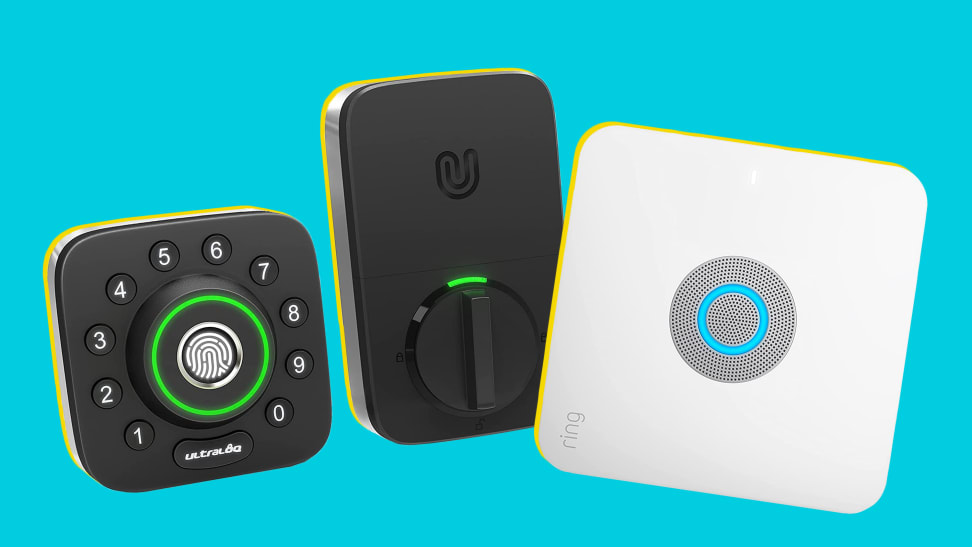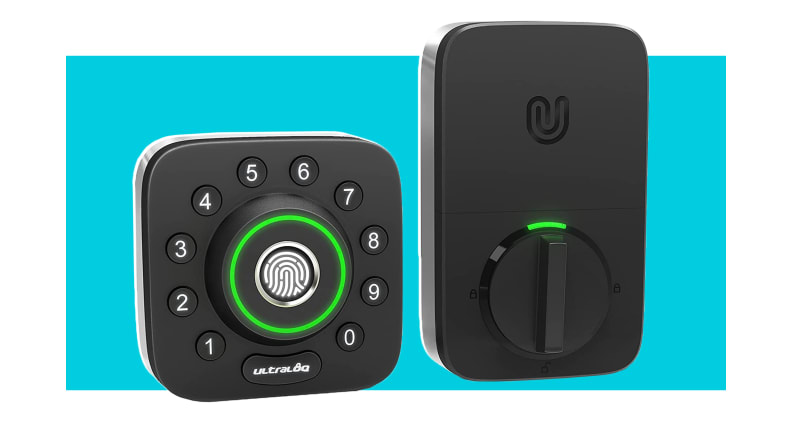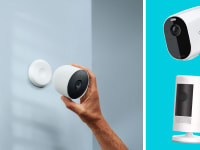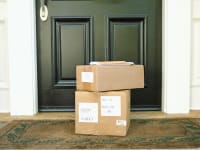7 home security mistakes you’re making—and how to fix them
Stay safe with these smart tips.
 Credit:
Reviewed / Jesse Flores / Ultraloq / Ring
Credit:
Reviewed / Jesse Flores / Ultraloq / Ring
Products are chosen independently by our editors. Purchases made through our links may earn us a commission.
Burglaries take place in the U.S. every day. Even if you live in a safe community, there’s always a chance that your home could be targeted, which is why it’s beneficial to have (at least) basic security measures in place to protect your family and belongings.
If you’re looking to improve your home’s security, there are a number of common mistakes that you might be making without even realizing it. The following are several ways you might be inadvertently putting your home at risk. (Spoiler alert: Smart tech can help!) Here are seven home security tips to protect your home.
1. Hiding a spare key outside

Leaving a spare key outside can now be a thing of the past.
If you’re prone to forgetting your keys, it’s tempting to hide a spare outside your home somewhere.
However, most burglars are savvy enough to look in common hiding spots—we’re talking under the doormat, a fake rock, or a potted plant. If you’re set on hiding a physical key, it’s a much better idea to use an outdoor lockbox, which is at least protected by a numerical code.
However, if you want to take your security to the next level, you should consider investing in one of the best smart locks, like the Ultraloq U-Bolt Pro Wi-Fi Smart Lock, which gives you six different ways to unlock the front door.
Smart locks make it easy to grant access to visitors, and many even have keypads that can be used as backup in case you forget your phone. With one of these locks on your door, you don’t have to hand out spare keys or worry about stashing a backup somewhere in your yard.
2. Leaving your windows unlocked
You probably lock the door when you leave the house, but do you take the same precautions with your windows? Statistics from Pop-A-Lock have shown that around 30% of burglars are able to enter homes through an unlocked window or door, so it’s important to keep them secured, especially if they’re easily accessible from the ground.
If you often forget to lock windows, you may want to use smart contact sensors to bolster your home security.
These sensors can often be integrated with your smart home security system—for instance, the Ring Alarm Contact Sensors work with the Ring Alarm System—and in addition to sounding a loud alarm to scare off intruders, sending a notification to your smartphone to let you know the window was opened.
There are also glass break sensors that can offer an additional layer of security for your home’s first floor windows.
Additionally, Amazon’s line of Echo smart speakers, as well as Google Nest smart displays and speakers, can listen for glass breaking and alert you to any problems at home.
3. Broadcasting your valuables
If your home can easily be seen from the road, it’s a good idea to keep valuables out of direct sight. For instance, you probably don’t want to leave your fancy new laptop right in front of the window. When valuables are easy to spot, it makes your home more appealing to would-be intruders.
One home security tip to keep people from seeing what’s inside your home is to invest in smart blinds for those easily-visible rooms.
Motorized windows coverings are becoming more popular within the smart home space. There are sleek, contemporary options available like the Serena by Lutron Motorized Solar Roller Shades, which can be set to an automatic schedule to open/close at certain times of the day.
This can help keep out prying eyes when your neighborhood is bustling, and depending on the style of blinds you choose, it may also help with heating/cooling costs, as well.
4. Letting your home look empty

Keeping the lights on while you're away increases security around your house.
Heading off on vacation with your family? Make sure not to broadcast your plans on social media, and don’t let your house look like it’s empty, either! Both of these common mistakes signal to bad actors that it’s the perfect time to break in.
Luckily, there are a few easy ways to make your home look occupied, even when you’re sitting on a beach far away.
Many smart lights have a “vacation mode” or “away mode,” like Kasa smart bulbs, that will randomly turn lights on and off throughout the day, making it appear as though someone is inside.
5. Leaving packages outside
Online shopping is the norm these days, and unfortunately, that means that package theft is more common than ever.
A recent study found that 49 million Americans have had at least one package stolen in the past 12 months, and if your deliveries often sit outside your home for several hours, you may become a target for porch pirates.
The good news is that there are several easy ways to keep tabs on your packages, starting with outdoor security cameras and/or video doorbells.
Many of today’s best models are equipped with smart alerts that can recognize packages, allowing you to see exactly when your delivery arrived and keep an eye on it until you return home. If someone does nab your package, you’ll also have video footage to bring to the police.
That’s not the only option for keeping packages safe, though. If you get frequent deliveries, it may be worthwhile to invest in a gadget like the BenchSentry by Genie Smart Delivery Box—the box automatically locks when a delivery is made, keeping your parcel safe until you return home.
Another option is the Amazon Key in-garage delivery, which works with myQ smart garage door openers, allowing your Prime packages to be safely placed in your garage.
6. Trying to self-monitor your security system
Most people who install DIY home security systems opt to monitor the system themselves, but what happens if something goes wrong when you don’t have your phone on you? It’s easy to miss alerts, which is why you may want to pay a little extra for professional monitoring, if it’s available.
For instance, the Ring Alarm Pro system, which is the best system we’ve tested, offers 24/7 professional monitoring for just $20 per month.
That’s less than it generally costs to order takeout from DoorDash, and you’ll have a dedicated team that monitors for burglary and intrusion, SOS calls, smoke, carbon monoxide, water/flooding, cold temperatures, and/or audible glass break detection, depending on the sensors you have in your home.
If there’s a problem and they can’t get in touch with you, the monitoring service will automatically dispatch emergency services to your home to address the issue.
At the end of the day, it’s a low price to pay for peace of mind.
7. Neglecting online security
When you think of “home security,” burglars and home intruders probably come to mind, but in today’s uber-connected world, digital security is just as important to keeping your family safe.
If your home’s internet network is ever compromised, hackers can gain access to your sensitive personal information, which can lead to serious headaches down the road.
The good news is that a few simple steps can greatly improve your network security:
Use strong passwords—that means uppercase and lowercase letters, numbers, and special characters. Bonus points if it’s not a dictionary word at all! (If it’s not your forte, password generators can always help with this.)
Always change your router’s default login credentials—the ones that come preset on the device are often available for anyone to find online.
Enable two-factor authentication on your accounts, if it’s available.
Keep your router and smart home devices up to date. Firmware updates for these devices often contain patches for security problems.
Additionally, many of today’s best Wi-Fi routers, like the Eero Mesh Wi-Fi system, offer advanced security features that can help detect and block malware, phishing attempts, and other online intrusions.
If you’re due for an upgrade—because, yes, you should generally get a new router every three to five years—a high-tech model is a worthwhile investment for network security.
The product experts at Reviewed have all your shopping needs covered. Follow Reviewed on Facebook, Twitter, Instagram, TikTok, or Flipboard for the latest deals, product reviews, and more.
Prices were accurate at the time this article was published but may change over time.


